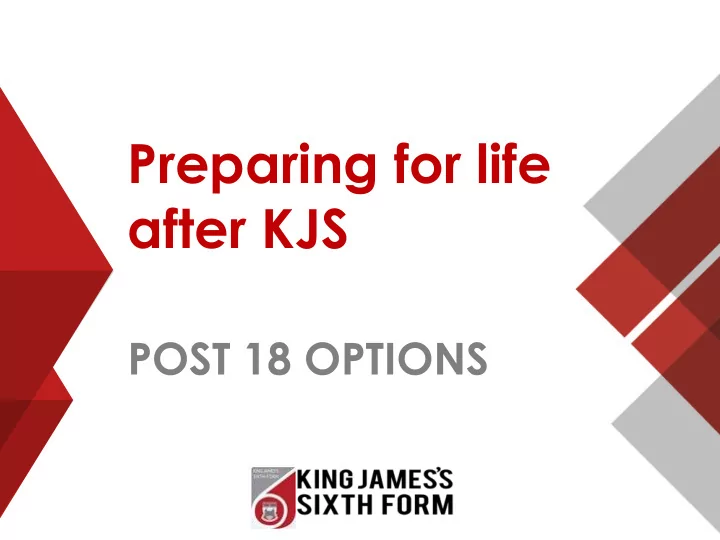

Preparing for life after KJS POST 18 OPTIONS
Students’ future plans? Can be a mystery!
Most want either enter higher education or employment
Our structured support includes… Tailored Information Advice and Guidance Providing Post 18 Options information Support university open day attendance Arrange university visitors Personal statement writing support Provide a digital student guidance booklet Academic reference and predicted grades Careers guidance Non-university support and Employability skills Gap year information and guidance Plus more individualised support where needed!
Higher Education – Course choice It is a big and important decision!
Drop out rates – too many! According to the Higher Education Statistics Agency (HESA), around 32,000 students who started university in 2016-17 did not continue beyond the first year. That is approximately 6.3% of the 504,000 who started. One of the biggest causes of this is students making the wrong choices! (mainly the wrong course or university choice).
Course Search – starting points UCAS Course Search the best place to start! You can start searching by location by entering your postcode.
Informed choices – starting points You will then get a list of universities and courses to research
Course pages – points to note
UNISTATS – Student feedback UNISTATS – Accessed through the Discover Uni website, very useful student feedback information.
Quality Measures – value for money? The UCAS website explains all you need to know about the Teaching Excellence Framework (TEF)
University League tables The factors include: entry requirements, staff/student ratio academic services and facilities expenditure per student, student satisfaction, staff/student ratio, research ratings, the distribution of degree classifications, completion rates and student destinations.
It’s important to be realistic! When choosing your five courses make sure you check the entry requirements. Pay particular attention to the UCAS tariff or points that they need to get a place on the course. BE REALISTIC!
It’s important to be realistic! A-Level When choosing your five courses make sure A* - 56 you check the entry requirements. A – 48 Pay particular attention B – 40 to the UCAS tariff or points that they need C – 32 to get a place on the course. D – 24 BE REALISTIC! E - 16 UCAS tariff
Choosing your course There are over 50,000 undergraduate courses at more than 395 providers in the UK. Students apply for 5 courses. Once they have received all of their responses they need to make a firm and an insurance choice.
Course A to Z – a broad choice Aerospace Engineering Nanoscience Botany Outdoor Activities Celtic Studies Puppetry - Animation Dietetics Quantum Science Egyptology Radio Production Footwear Design Space Science & Robotics Games Development Teaching History Ukrainian Irish Studies Vietnamese and Music Jazz Water Biology Knitwear Design X Law Yacht Design Model Making Zoology
Remember - all courses are different Unlike schools, courses at universities are all different. An English or History degree at one university will be different from English or History degree at another. Courses are designed around the interests, strengths and research specialism of the academic staff. Students MUST do their research to ensure they know what the course content is. Remember you will be studying that subject for the next 3 or 4 years! You might want to consider a ‘ sandwich ’ course or studying abroad . DON’T FORGET – YOU WILL BE PAYING THOUSANDS OF POUNDS IN TUITION FEES TO THE UNIVERSITY . YOU should NOT spend that much money without ensuring you know exactly what you are buying, and that it meets your needs and expectations.
Bursary/Scholarships/Access Access schemes Bursaries and scholarships All universities have a These refer to financial ‘widening help in addition to participation’ budget student loans and to attract students who grants – the money does not have to be may not automatically paid back. The terms consider going into 'bursary' and higher education. 'scholarship' are used interchangeably and each university has its own terminology . Research these on UCAS and university websites.
UCAS Services and Key Dates UCAS Extra – Available from February for students who made 5 choices but hold no offers. Clearing – Available between July and October for students with no offers or unwanted offers, late applications and students who do not meet the conditions of the offers. Adjustment - Adjustment is available from A level results day until the end of August. If a student has met and exceeded the conditions of their conditional firm offer, they may be able to use Adjustment to find an alternative course.
Student finance – more research Application guidance UCAS parents guide
UCAS Services and Key Dates 15 th October – Early entry deadline (Oxbridge, Medicine/Veterinary Science and dentistry 1 st October – UCAS Conservatoires (Music), (Dance, Drama and musical theatre may have different deadlines - check course details) 15 th January – General entry deadline We have our own internal deadlines. Please see the handout for a more detailed overview of key dates our internal deadlines and student expectations. All applications completed by 13 th November to guarantee meeting the UCAS deadline. It is a very smooth process as along as students stick to the deadlines and follow the instructions.
Summary Do the research. Focus on entry requirements Get help and advice . Teachers, parents, lecturers, admissions tutors, current students. Do some comparisons. Various league tables, student satisfaction surveys, comparisons websites can be found easily on-line. Read up about the course and the university . Universities all produce a prospectus which you should read before making your choices. Location, location, location . Think about where do you want to study? Big City? Campus? Move Away/Stay at home? Costs? Attend a HE convention and collect as much information as possible. Go and see for yourself www.opendays.com Stick to the deadlines!
UCAS – Advice for parents – click on the link below
Don’t forget, we are here to help and support you throughout this process!
Recommend
More recommend